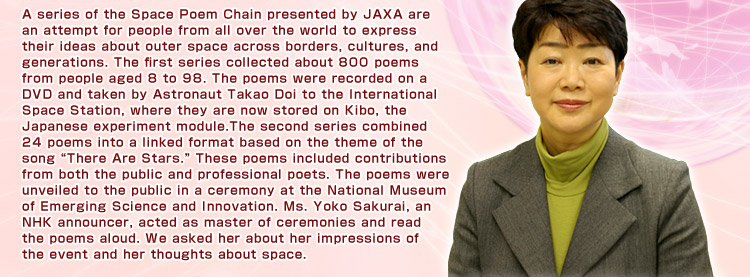

Yoko Sakurai
Born in Niigata Prefecture, Yoko Sakurai began her career at NHK after graduating from Meiji University. She currently belongs to the Tokyo Announcer Room, where she plays an active role in news and education programs. She experienced the Mid-Niigata Prefecture Earthquake of 2004 when she returned home, and learned important lessons from that experience, which she has used in special programs on earthquakes. She appears on such programs as The NHK Archives, Here Comes Darwin! The New Legend of Living Creatures, and Let's Connect Our Hearts.
I really enjoyed playing the role of MC at the symposiums of the Space Poem Chain. I love literature, and have been interested in outer space since I was a child, so I was excited to take part in the events.
This time, the poems included some compiled by JAXA, and some written by students of Yamashiro Elementary School in the city of Kofu, Yamanashi, and Keio Girls' High School in Tokyo. Meanwhile, the group led by the Yamanashi Prefectural Science Museum attracted entries from the public, and those poems were put together into one poem titled “A Star-Weaving Song.” I think that space poems have become popular among children and younger people. By taking part in this event, I really came to realize that a new program based on the theme of outer space had started.
I'm not a literary critic, so it's hard for me to comment on the poems, but the quality this time seemed to be higher than the last time, since professional poets from other countries took part in the event. In a way, though, I felt the first event was better because it had a friendlier atmosphere, with participation by ordinary people of various ages. This time, people in Yamanashi Prefecture wrote a poem titled “A Star-Weaving Song” by putting together public entries from all over Japan. It was an attempt to look up at the stars and express their feelings about them by weaving their words into one poem. The completed song was unveiled by Ms. Ayaka Hirahara, who sang it in front of the participants. The feelings of the people who wrote the lyrics were condensed and united as one, and I saw possibilities of a great future in this emotional event.
Q. Do things like the Space Poem Chain inspire your imagination regarding outer space?

Earth (Courtesy of NASA)
Of course they do. Having participated in these events, I now feel outer space is closer to me. I've been interested in space and I've wanted to see the Earth floating in space with my own eyes. Participation in these kind of events makes my feelings about space still stronger.
I saw an image of the Earth floating in space for the first time in a photo book called Earth the Mother Planet (published in 1998 by Shogakukan). It included photographs of the Earth and poems by astronauts. I was extremely moved when I saw those photos. Poet Noriko Ibaraki wrote, in a poem titled “Water Planet” (published by Chikuma Shobo):
What has surprised me most
is the fact the Earth keeps revolving
without any water dripping from it.
I was similarly amazed when I saw photos of the Earth floating in space, and those images have stayed bright in my mind. I am always deeply moved by the image of the Earth rising over the moon, in photos taken by Kaguya, the lunar explorer developed by JAXA. These photos are touching enough, so how wonderful it would be if I could see the Earth floating in space with my own eyes!

Orion
(Courtesy of NASA, Matthew Spinelli)
Q. What interests you about outer space?
Our planet is part of the solar system, and space is such a fundamental part of our existence that I want to know more about it. When I was a child, I liked gazing at the stars in Niigata, my hometown. I especially loved the constellation of Orion shining in the night sky. The sky of Niigata in winter was often covered with clouds, even when it wasn't snowy, so I was always thrilled by the sight of the bright stars in the sky, as if I'd found a treasure.
After I started to work for NHK, I was involved in the production of a program titled Great Travels on Earth as a narrator. Through this program, I came to realize that I am here as a result of the 4.6 billion-year evolution of the Earth, which made me still more interested in outer space.